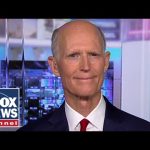Surprisingly, discussions around a recent political campaign have stirred up a whirlwind of opinion and speculation. Donald Trump, always one for robust debate, recently suggested that the Republican Party needs to rally together during this challenging time. He emphasized the importance of unity and proposed that the party utilize its leftover funds wisely while focusing on the power of earned media. After all, when it comes to campaigning, sometimes it’s not about how much money is spent but how effectively it is used.
Meanwhile, the conversation took a more speculative turn involving figures from finance and celebrity. Jordan Belfort, famously known as the original “Wolf of Wall Street,” brought his unique perspective. He boldly hinted at the possibility that certain financial practices within the campaign were less than honorable, suggesting the operation resembled a money laundering scheme rather than a legitimate political venture. One can’t help but wonder if this is just a businessman’s spin on political intrigue or if there’s something more tangible beneath the surface.
Belfort was particularly bewildered by the involvement of high-profile figures like Oprah Winfrey, questioning why someone of her stature would need a million dollars for a campaign. His astonishment seemed to stem from the belief that Oprah, a trusted figure, would be more inclined to support a cause she truly believed in rather than seek profit. However, Belfort’s skepticism didn’t stop there; he suggested that the campaign had a habit of painting a deceptively bright picture while seemingly ignoring the financial darkness lurking nearby.
The topic of inflated consultant salaries surfaced as another point of contention. Belfort claimed that there appeared to be an excessive amount of money funneled toward consultants, with the practice of hiring further consultants to handle expenses. This raised eyebrows and sparked an even more critical view of the campaign’s financial management and decision-making processes. Quite frankly, Belfort’s sarcastic remarks about certain spending choices made one wonder what those behind these financial decisions were thinking.
The dialogue surrounding this campaign morphs into pure comedy in a world where political blunders can seem as absurd as a sitcom episode. The assertion that voters would flock to the polls simply because of flashy advertising seemed preposterous. Belfort didn’t hold back as he described the situation as a grand setup for failure, a sentiment that elicited more laughter than agreement from his audience.
As discussions continued, it became clear that the stakes are incredibly high when it comes to political campaigns and money. Yet, rather than panicking, the conversation remained light-hearted, encapsulating the absurdity of it all. After all, nothing galvanizes a group, like the idea of spectacular failures and questionable spending. As opinions settle, one thing remains clear: politics, much like finance, can often provide unintended comedy, much to the delight of everyone watching from the sidelines.




